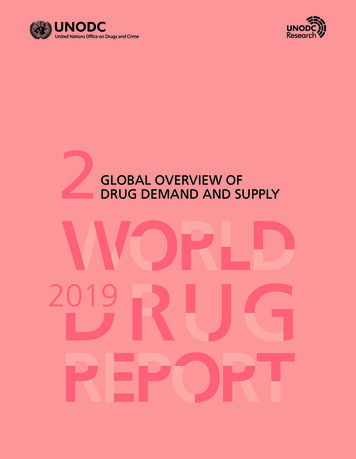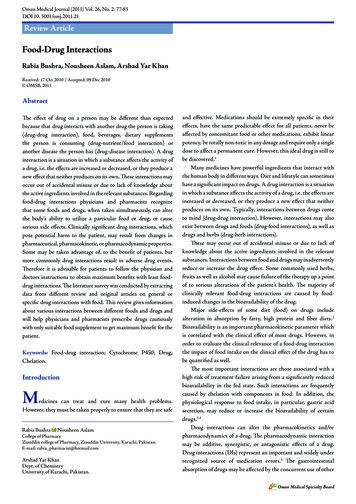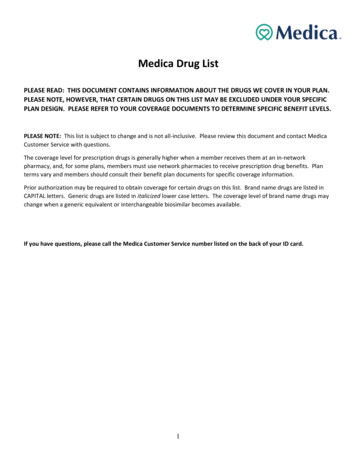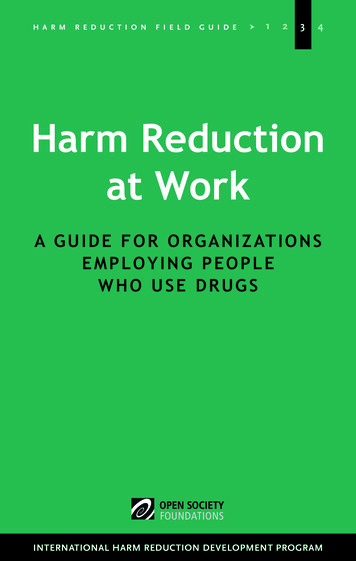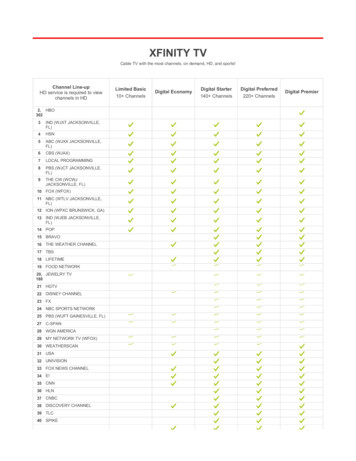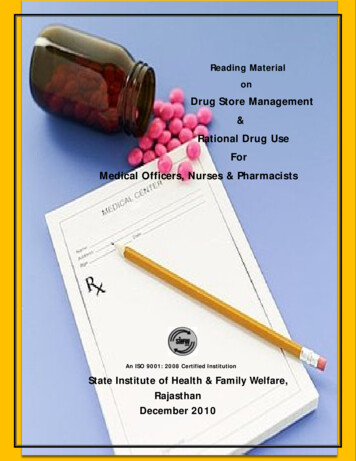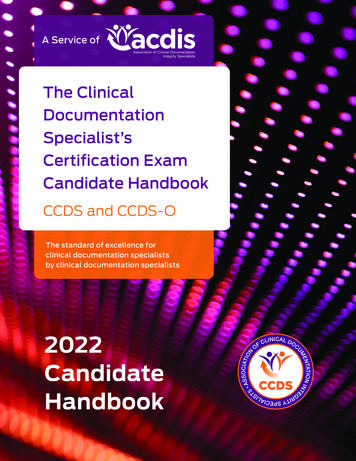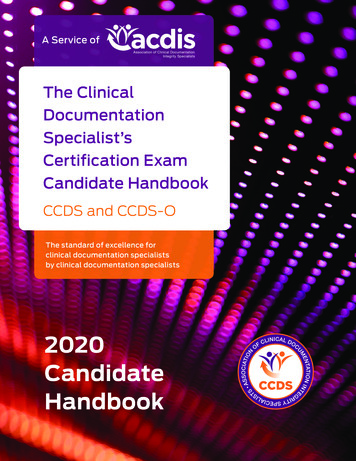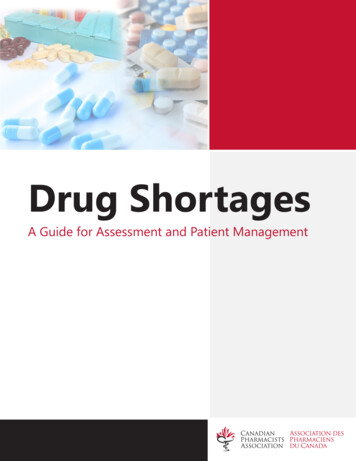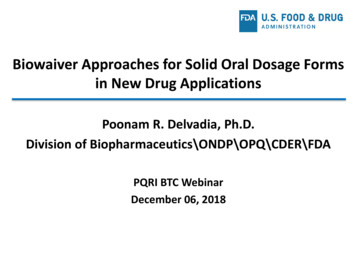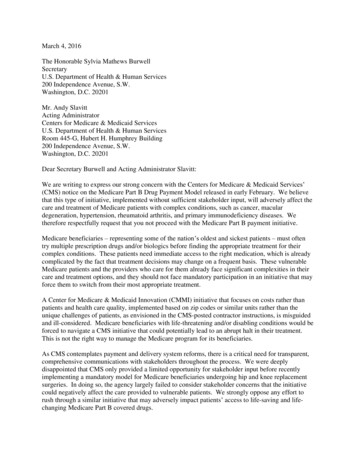
Transcription
March 4, 2016The Honorable Sylvia Mathews BurwellSecretaryU.S. Department of Health & Human Services200 Independence Avenue, S.W.Washington, D.C. 20201Mr. Andy SlavittActing AdministratorCenters for Medicare & Medicaid ServicesU.S. Department of Health & Human ServicesRoom 445-G, Hubert H. Humphrey Building200 Independence Avenue, S.W.Washington, D.C. 20201Dear Secretary Burwell and Acting Administrator Slavitt:We are writing to express our strong concern with the Centers for Medicare & Medicaid Services’(CMS) notice on the Medicare Part B Drug Payment Model released in early February. We believethat this type of initiative, implemented without sufficient stakeholder input, will adversely affect thecare and treatment of Medicare patients with complex conditions, such as cancer, maculardegeneration, hypertension, rheumatoid arthritis, and primary immunodeficiency diseases. Wetherefore respectfully request that you not proceed with the Medicare Part B payment initiative.Medicare beneficiaries – representing some of the nation’s oldest and sickest patients – must oftentry multiple prescription drugs and/or biologics before finding the appropriate treatment for theircomplex conditions. These patients need immediate access to the right medication, which is alreadycomplicated by the fact that treatment decisions may change on a frequent basis. These vulnerableMedicare patients and the providers who care for them already face significant complexities in theircare and treatment options, and they should not face mandatory participation in an initiative that mayforce them to switch from their most appropriate treatment.A Center for Medicare & Medicaid Innovation (CMMI) initiative that focuses on costs rather thanpatients and health care quality, implemented based on zip codes or similar units rather than theunique challenges of patients, as envisioned in the CMS-posted contractor instructions, is misguidedand ill-considered. Medicare beneficiaries with life-threatening and/or disabling conditions would beforced to navigate a CMS initiative that could potentially lead to an abrupt halt in their treatment.This is not the right way to manage the Medicare program for its beneficiaries.As CMS contemplates payment and delivery system reforms, there is a critical need for transparent,comprehensive communications with stakeholders throughout the process. We were deeplydisappointed that CMS only provided a limited opportunity for stakeholder input before recentlyimplementing a mandatory model for Medicare beneficiaries undergoing hip and knee replacementsurgeries. In doing so, the agency largely failed to consider stakeholder concerns that the initiativecould negatively affect the care provided to vulnerable patients. We strongly oppose any effort torush through a similar initiative that may adversely impact patients’ access to life-saving and lifechanging Medicare Part B covered drugs.
We believe these types of initiatives should be initially implemented in a targeted, patient-centeredand transparent way that accounts for the unique needs of Medicare beneficiaries. In fact, CMMI isstatutorily required to ensure that its initiatives target “deficits in care,” and can only expand thescope and duration of a model after careful assessment of the model’s impact on quality of care,patient access, and spending. We are very concerned, therefore, that CMS plans to implement aninitiative that would immediately impact a range of Part B providers and would be applied to “mostPart B drugs.” Furthermore, given the success of the current Part B reimbursement methodology inensuring patient access to the most appropriate treatments, it is unclear what “deficits in care” CMSis attempting to address in this initiative.CMS expressed concern in its contractor notice that the 6% ASP add-on payment may “encouragethe use of more expensive products because the add-on to the drug’s cost is a percentage of the salesprice.” This assumption fails to take into account the fact that providers’ prescribing decisionsdepend on a variety of factors, including clinical characteristics and the complex needs of theMedicare population. Most importantly, there is no evidence indicating that the payment changescontemplated by the model will improve quality of care, and may adversely impact those patientsthat lose access to their most appropriate treatments. In fact, data suggests that the current Part Bdrug payment system has been both cost effective and successful in ensuring patient access to theirmost appropriate treatment, as Part B expenditures remain relatively stable1 and Part B drugs accountfor just 3% of total program costs.2Finally, CMS must recognize that the Budget Control Act cut Medicare reimbursement forphysician-administered drugs, further impacting some providers’ ability to purchase drugs at thecurrent payment rate. It is imperative CMS understands and evaluates this current reimbursementrate and its outcome while engaging multiple stakeholders before implementing any demonstrationthat would further reduce reimbursement rates. In closing, we urge you to ensure that our nation’soldest and sickest patients continue to be able to access their most appropriate drugs and services.We therefore ask that you permanently withdraw the Part B Drug Payment Model fromconsideration.Sincerely,ADAP Advocacy Association (aaa )Aimed AllianceAlabama Cancer CongressAlliance for Patient Access (AFPA)Alliance for Regenerative MedicineAmerican Academy of Allergy Asthma and Immunology (AAAAI)American Academy of OphthalmologyAmerican Autoimmune Related Diseases Association (AARDA)American Bechet's Disease AssociationAmerican College of Rheumatology12015 Medicare Trustees Report.Medicare Payment Advisory Commission, “Medicare Drug Spending;” presentation at September 2015 publicmeeting; available at: ting-presentation-medicare-drugspending.pdf?sfvrsn 0.2
American Gastroenterological AssociationAmerican Kidney FundAmerican Society of Clinical OncologyAmerisourceBergenArthritis FoundationAssociation of Community Cancer Centers (ACCC)Association of Northern California OncologistsBiotechnology Innovation Organization (FKA Biotechnology Industry Organization)Cancer Support CommunityCancerCareCardinal HealthCaregiver Action NetworkCOA Patient Advocacy Network (CPAN)Coalition of Hematology Oncology Practices (CHOP)Coalition of State Rheumatology Organizations (CSRO)Colon Cancer AllianceCommunity Access National Network (CANN)Community Oncology AllianceConnecticut Oncology AssociationCutaneous Lymphoma FoundationFabry Support and Information GroupFight Colorectal CancerFlorida Society of Clinical OncologyGeorgia Society of Clinical OncologyGlobal Colon Cancer AssociationGlobal GenesGlobal Healthy Living FoundationHawaii Society of Clinical OncologyHealthcare Distribution Management AssociationHealthcare Leadership CouncilHealthHIVIdaho Society of Clinical OncologyIllinois Medical Oncology SocietyImmune Deficiency Foundation (IDF)Indiana Oncology SocietyInternational Cancer Advocacy Network (ICAN)ION SolutionsIowa Oncology SocietyKansas Society of Clinical OncologyLarge Urology Group Practice Association (LUGPA)Louisiana Oncology SocietyLung Cancer AllianceMcKessonMedical Oncology Association of Southern CaliforniaMen's Health NetworkMichigan Society of Hematology and OncologyMidwest Oncology Practice SocietyMinnesota Society of Clinical OncologyMississippi Oncology Society
Missouri Oncology SocietyMontana State Oncology SocietyNational Alliance on Mental IllnessNational Association for Rural Mental HealthNational Association of County Behavioral Health & Developmental Disability Directors(NACBHDD)National GrangeNational Hispanic Medical AssociationNational Infusion Centers Association (NICA)National Minority Quality ForumNational MPS SocietyNational Patient Advocate FoundationNational Psoriasis Foundation (NPF)Nevada Oncology SocietyNorth Carolina Oncology AssociationNorthern New England Clinical Oncology SocietyOhio Hematology Oncology SocietyOklahoma Society of Clinical OncologyOncology Nursing SocietyOncology Society of New JerseyPCaBluePharmaceutical Research and Manufacturers of America (PhRMA)Premier Oncology Hematology Management Society (POHMS)Prevent Cancer FoundationPulmonary Hypertension AssociationRetireSafeRocky Mountain Oncology SocietySalud USASociety for Women's Health ResearchSociety of Gynecologic OncologySociety of Utah Medical OncologistsSouth Carolina Oncology SocietyTennessee Oncology Practice SocietyTexas Society of Clinical OncologyThe Arizona Clinical Oncology SocietyThe US Oncology NetworkVasculitis FoundationVeterans Health CouncilVietnam Veterans of AmericaVirginia Association of Hematologists & OncologistsWest Virginia Oncology SocietyWisconsin Association of Hematology & OncologyZERO - The End of Prostate Cancercc: Patrick Conway, MD, MScActing Principal Deputy Administrator, Deputy Administrator for Innovation & Quality,CMS Chief Medical OfficerCenters for Medicare & Medicaid Services
Tim Gronniger, MPP, MHSADirector of Delivery System ReformCenters for Medicare & Medicaid ServicesThe Honorable Orrin HatchChairmanCommittee on FinanceU.S. SenateThe Honorable Ron WydenRanking MemberCommittee on FinanceU.S. SenateThe Honorable Fred UptonChairmanCommittee on Energy and CommerceU.S. House of RepresentativesThe Honorable Kevin BradyChairmanCommittee on Ways and MeansU.S. House of RepresentativesThe Honorable Frank PalloneRanking MemberCommittee on Energy and CommerceU.S. House of RepresentativesThe Honorable Sander LevinRanking MemberCommittee on Ways and MeansU.S. House of Representatives
American Academy of Allergy Asthma and Immunology (AAAAI) American Academy of Ophthalmology American Autoimmune Related Diseases Association (AARDA) American Bechet's Disease Association American College of Rheumatology 1 2015 Medicare Trustees Report.
